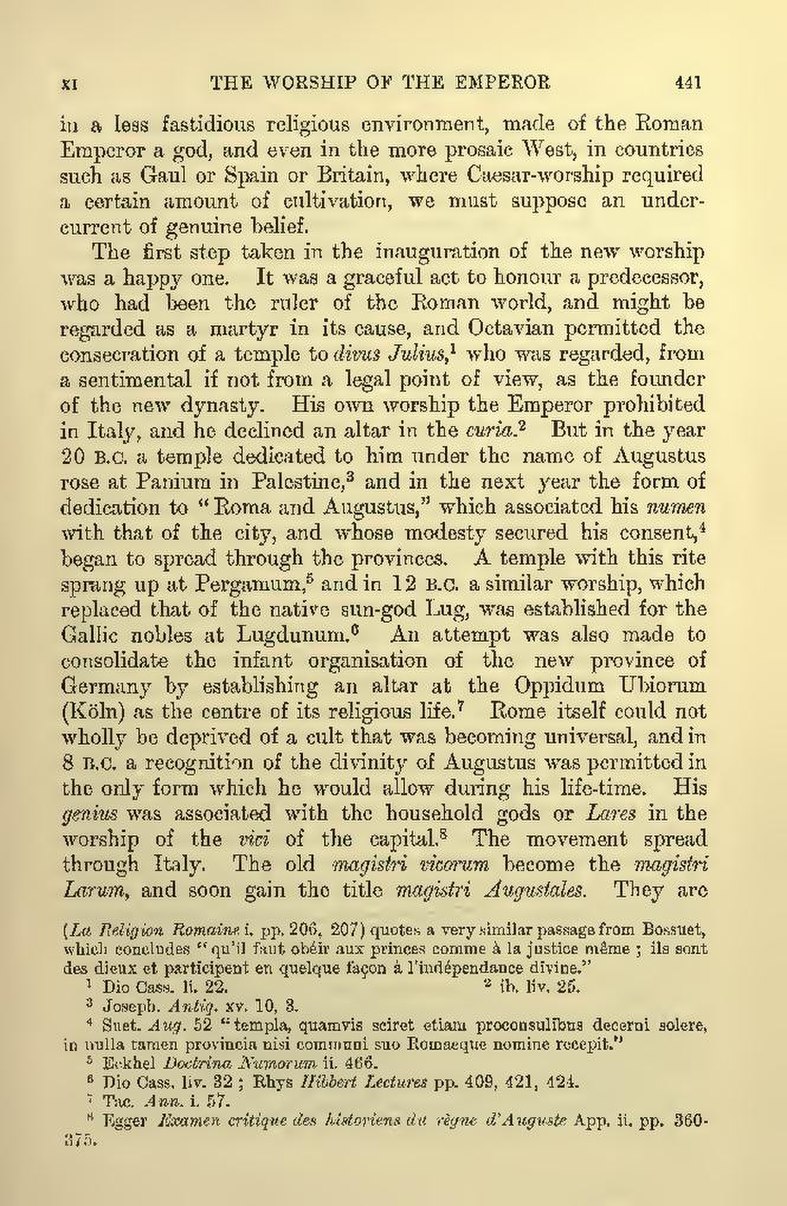in a less fastidious religious environment, made of the Roman Emperor a god, and even in the more prosaic West, in countries such as Gaul or Spain or Britain, where Caesar-worship required a certain amount of cultivation, we must suppose an undercurrent of genuine belief.
The first step taken in the inauguration of the new worship was a happy one. It was a graceful act to honour a predecessor, who had been the ruler of the Roman world, and might be regarded as a martyr in its cause, and Octavian permitted the consecration of a temple to divus Julius,[1] who was regarded, from a sentimental if not from a legal point of view, as the founder of the new dynasty. His own worship the Emperor prohibited in Italy, and he declined an altar in the curia.[2] But in the year 20 B.C. a temple dedicated to him under the name of Augustus rose at Panium in Palestine,[3] and in the next year the form of dedication to "Roma and Augustus," which associated his numen with that of the city, and whose modesty secured his consent,[4] began to spread through the provinces. A temple with this rite sprang up at Pergamum,[5] and in 12 B.C. a similar worship, which replaced that of the native sun-god Lug, was established for the Gallic nobles at Lugdunum.[6] An attempt was also made to consolidate the infant organisation of the new province of Germany by establishing an altar at the Oppidum Ubiorum (Köln) as the centre of its religious life.[7] Rome itself could not wholly be deprived of a cult that was becoming universal, and in 8 B.C. a recognition of the divinity of Augustus was permitted in the only form which he would allow during his life-time. His genius was associated with the household gods or Lares in the worship of the vici of the capital.[8] The movement spread through Italy. The old magistri vicorum become the magistri Larum, and soon gain the title magistri Augustales. They are
- [Footnote: (La Religion Romaine i. pp. 206, 207) quotes a very similar passage from Bossuet,
which concludes "qu'il faut obéir aux princes comme à la justice même; ils sont des dieux et participent en quelque façon à l'indépendance divine."]
- ↑ Dio Cass. li. 22.
- ↑ ib. liv. 25.
- ↑ Joseph. Antiq. xv. 10, 3.
- ↑ Suet. Aug. 52 "templa, quamvis sciret etiam proconsulibus decerni solere, in nulla tamen provincia nisi communi suo Romaeque nomine recepit."
- ↑ Eckhel Doctrina Numorum ii. 466.
- ↑ Dio Cass. liv. 32; Rhys Hibbert Lectures pp. 409, 421, 424.
- ↑ Tac. Ann. i. 57.
- ↑ Egger Examen critique des historiens du règne d'Auguste App. ii. pp. 360-375.
